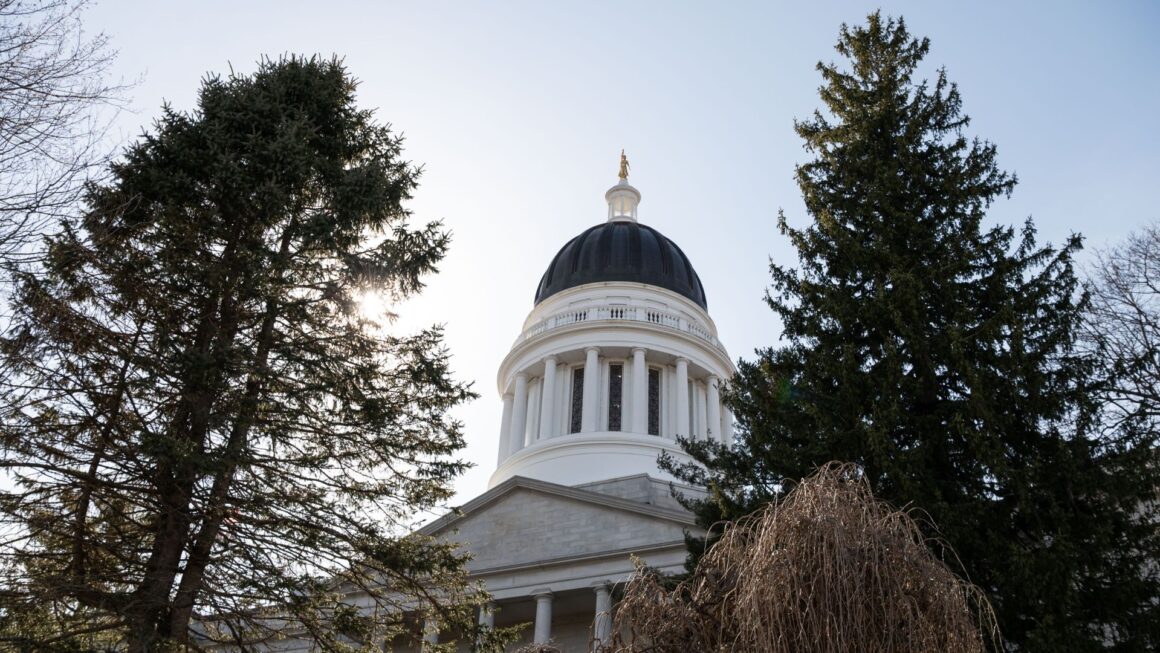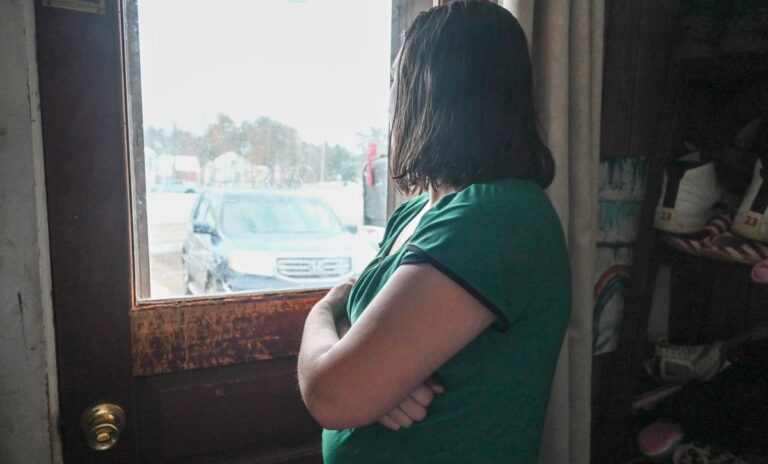Reverend Gwen Fry realized she was a transgender woman in 1976 as she watched the transgender tennis player Renée Richards fight to compete in the U.S. Open as a woman.
Now an Episcopal priest working in Waterville, Fry joined dozens of clergy and religious leaders from across Maine this spring to testify against a slew of bills that aimed, in part, to prevent transgender athletes from participating in women’s sports.
“My church and now my state protects the trans community,” Fry said in her testimony. “I no longer live in fear to leave my house like I did in Arkansas because of the protections afforded me here in Maine. If these bills pass we will be taking giant steps backwards and my small community will experience a return to the same discrimination and oppression I fled moving to Maine.”

Debate over transgender athletes in Maine garnered national attention this year after Rep. Laurel Libby (R-Auburn) posted a photograph of a transgender high school athlete on social media and Governor Janet Mills sparred with President Donald Trump at the White House.
State legislators introduced eight bills to prevent transgender youth from using restrooms aligned with their gender identity or participating in women’s sports, as well as to remove gender identity from the Maine Human Rights Act. Oral testimony stretched over 14 hours, and more than 1,200 Mainers submitted written testimony on at least one of the bills. The state legislature ultimately rejected all eight bills in June, largely along party lines.
A Maine Monitor analysis found that roughly 50 clergy members, religious leaders and other representatives of faith-based groups testified individually on the anti-transgender legislation — significantly more than testified on abortion legislation this session. All but four of them opposed the bills, invoking their faith to defend the rights of transgender youth.
“Both Hebrew and Christian scripture are super clear about doing justice,” said Jane Field, a Presbyterian minister who leads the Maine Council of Churches. “They’re also super clear about standing with and for the marginalized, the outcast, the vulnerable, and if there were ever a poster child for someone who’s marginalized, outcast and scapegoated, it’s a trans youth.”
On the other side, the Christian Civic League of Maine, a conservative advocacy group, submitted a letter signed by 178 clergy in support of the bills. The group argued that God created man and woman and “policies that ignore these biological and Biblical realities do a great disservice to young women and undermine the very essence of fair competition.”
Rep. Elizabeth Caruso (R-Caratunk) told The Maine Monitor the point of the two bills she sponsored — L.D. 868 and L.D. 1337 — was to protect girls from discrimination and restore fair competition.
“Regardless of religious belief or even political affiliation, the majority of Mainers and Americans clearly see that allowing males to compete in girls’ sports is unfair, discriminatory, and denies biological reality,” Caruso wrote in an email.
A poll from the University of New Hampshire published in late March found that nearly two-thirds of Mainers believed that transgender women should not be allowed to compete in women’s sports.
Faith-based opposition
Many of the religious leaders who submitted testimony opposing the bills focused on human dignity and compassion for marginalized people.
The majority of them were members of the United Church of Christ or the Episcopal Church, or were Unitarian Universalists. The Maine Council of Churches, a coalition of seven Protestant denominations, put out a call asking clergy and congregants to testify against the bills from a religious standpoint.
Field, from the Maine Council of Churches, wrote that God gave humanity “a rich variety of gender identities and sexual orientations” and said that people of faith have a responsibility to protect the vulnerable and stand with the marginalized, including transgender youth.
One Quaker woman wrote that God created people across a gender spectrum: “Just as God created day and night,” she wrote, “He also created dawn and dusk, in-between times that are especially beautiful.”
A retired United Methodist minister wrote in her testimony that she didn’t fully understand what being transgender meant. Still, she added, “I do understand that transgender people are beloved children of God who deserve to have all the rights and privileges that cisgender people enjoy.”
Several rabbis also testified against the bills. Jared Saks, a rabbi in Portland, wrote that his support for transgender people was rooted in Jewish text and tradition. He pointed out references to “at least six different sex and gender identities” from historic Jewish legal codes and rabbinic commentary.
“How we treat others, especially those on the fringes of society, is a reflection of our relationship with God,” Saks wrote.
Testimony in support of the bills
Of the four people affiliated with religious organizations who spoke individually in support of the bills, three were policy advocates with the Christian Civic League of Maine and one was Suzanne Lafreniere, director of public policy for the Roman Catholic Diocese of Portland.
Lafreniere wrote in her testimony that the diocese “opposes the advancement of gender theory, especially in places where young people are affected.” She referred to biological sex as “a gift from God” which “shapes how we participate in His self-giving love.”
Policies governing athletics and facilities, Lafreniere wrote, should respect biological differences between men and women.
“At its root, this issue is not just political — it is spiritual,” Nick Adolphsen, executive director of the Christian Civic League of Maine, wrote in his testimony in support of one of the bills. “The Enemy has always attacked what God declared good. And today, that attack is focused on human identity.”
He told The Monitor that his testimony didn’t come from a place of hate for transgender people, but that in his view, affirming transgender people’s identities is a mistake.
“For me as a Christian, as a believer in the Gospel, I have this responsibility to advocate for things that I believe are true and right and biblical,” Adolphsen said, “but I also have a responsibility to do it in a way that is full of love and full of truth. That’s not always an easy balance.”
The Christian Civic League didn’t put out a call asking clergy to testify individually, Adolphsen said, which could be part of why fewer religious leaders spoke or wrote in support of the bills. The League’s letter, signed by nearly 180 clergy, echoed Adolphsen’s argument.
Everyone who testifies speaks from deeply held beliefs, he said, and he expects the cultural conversation to continue even though the legislation was defeated.
Shifting perceptions
Jodi Cohen Hayashida, a Unitarian Universalist minister and director of Multifaith Justice Maine, a project of the Maine People’s Alliance, was one of the faith leaders who testified against the legislation. She said she believes the religious right pivoted to mobilizing around transgender issues as a way to rally their base after abortion became a losing issue in the wake of Dobbs v. Jackson.
“It didn’t really catch hold until they landed on the issue of trans women in sports,” Hayashida said, “because that created internal conflict with people who love children, who love women, who believe every life is sacred and that we should all have equal access, and tried to put that in direct conflict with the humanity of trans people.”
In a 2023-24 religious landscape study, the Pew Research Center found that 47 percent of Christians believed greater social acceptance of transgender people was a “change for the worse,” with only 29 percent saying it was a “change for the better.” Most religiously unaffiliated people and people from other religions said it was a change for the better.
In 2022, Pew found that white evangelical protestants were the most likely group to believe gender is determined by sex at birth. That belief grew among religious groups across the board between 2017 and 2022 as political rhetoric about transgender people increased. White evangelical protestants were also the most likely to say religion had a “great deal” of influence on their beliefs about gender and sex.
R. Marie Griffith, a professor at Washington University in St. Louis who studies religion and politics, explained that LGBTQ rights have divided Christian denominations in recent decades. The Anglican Church of North America, for example, was founded in 2009 by former members of the Episcopal Church who disagreed with Episcopalian teachings on social issues including gay marriage.
Conservative churches have generally been more effective at motivating their congregations around social issues, including transgender policies, Griffith said. People on the religious left are less likely to go to weekly services, and that limits pastors’ impacts on their beliefs.
“Conservative churches have been much more successful in persuading people this is your community … Mega churches provide all kinds of services for people, and I think it’s a haven from the secular world,” Griffith said. “Whereas people on the religious left, the world is their world.”
For her part, Fry said she found affirmation in scripture after coming out to her congregation in Little Rock, Arkansas, in 2014. The Episcopal Church had updated its canon in 2012 to formally prohibit discrimination in the ordination process on the basis of gender identity and expression. Policy aside, Fry was quickly fired after publicly identifying as a transgender woman.
When a clergy friend invited Fry to an intimate service the next Sunday, Fry had lost track of the liturgical calendar. She didn’t realize until the service began that it centered on the transfiguration, a moment in the Bible when Jesus reveals his full form to several disciples.
“I just sat down in my pew and just started to quietly weep,” Fry said. “Here I was, going to the church for the first time as Gwen, as my true self, and here’s the Gospel reading of Jesus disclosing his true self to the three who went up the mountain with him … In that Gospel, what Jesus told the disciples was ‘Get up, do not be afraid.’ That has stuck with me ever since.”







